The coronavirus has infected more than 6.5 million people around the world as of Thursday, killing at least 386,289 people.
George Floyd, a black man who was killed while in police custody in Minneapolis last week, tested positive for coronavirus weeks before his death, according to an autopsy report from the Hennepin County Medical Examiner's Office.
White House health advisor Dr. Anthony Fauci said Tuesday he's concerned about the "durability" of a potential coronavirus vaccine, adding that there's a chance it might not provide long-term immunity. And former Food and Drug Administration Commissioner Dr. Scott Gottlieb told CNBC Wednesday that any effective vaccine will likely still be seasonal.
The coverage on this live blog has ended — but for up-to-the-minute coverage on the coronavirus, visit the live blog from CNBC's U.S. team.
- Global cases: More than 6.5 million
- Global deaths: At least 386,091
- U.S. cases: More than 1.85 million
- U.S. deaths: At least 107,175
The data above was compiled by Johns Hopkins University.
LVMH confirms it has discussed coronavirus' 'potential impact' on Tiffany takeover
European luxury group LVMH signaled on Thursday that the pandemic could affect its $16.2 billion acquisition of the U.S. jeweler Tiffany.
The group said in a statement that its board of directors had met on Tuesday to discuss "the development of the pandemic and its potential impact on the results and perspectives of Tiffany & Co with respect to the agreement that links the two groups."
Reuters reported Wednesday that LVMH could seek to renegotiate its purchase of Tiffany, citing unnamed sources familiar with the matter, given the pandemic and U.S. civil unrest, and its effect on the retail sector. — Holly Ellyatt
Dubai hands out fines to beachgoers not wearing masks
Dubai police has fined more than 100 people visiting public beaches for failing to adhere to coronavirus safety rules. Public beaches in Dubai reopened on May 30, after more than two months of closure.
Those not wearing masks on the beach, and not adhering to social distancing requirements of 2 meters, were fined on the spot, police said.
"People were not adhering to precautionary measures and during the first three days of reopening beaches, around 100 fines were issued against offenders," Lt. Col. Ahmad Al Marzouqi, from the Dubai Police beaches security section, told local media. "But when we started implementing fines, people began to adhere to rules." — Natasha Turak
Mexico overtakes U.S. in daily number of coronavirus deaths for first time
3:20 p.m. (Singapore time) — Mexico reported more daily deaths than the U.S. for the first time on Wednesday. It had a record 1,092 fatalities, while the U.S. reported 1,045 deaths on Wednesday, according to Reuters.
That sharp jump in numbers was attributed to improved documenting, the report said, after growing criticism that its limited test rate meant most cases and deaths were not being recorded. — Weizhen Tan
George Floyd had coronavirus, according to medical examiner's autopsy
1:50 p.m. (Singapore time) — George Floyd, a black man who was killed while in police custody in Minneapolis last week, tested positive for coronavirus weeks before his death, according to an autopsy report from the Hennepin County Medical Examiner's Office. NBC News reported that the document showed an April 3 test was positive for the virus' RNA, which can remain in the body weeks after a disease clears.
The autopsy said a second positive test after his death likely indicated that Floyd was asymptomatic from an earlier infection when he died May 25, NBC reported. The CDC has previously said that a positive RNA test does not necessarily indicate that the virus is infectious.
NBC reported that it wasn't immediately clear if Floyd developed symptoms earlier or was entirely asymptomatic. Floyd's death has sparked widespread protests against police violence in dozens of cities across the country. — Christine Wang
GM updates North American production timeline
8:30 p.m. ET — General Motors Chairman and CEO Mary Barra said the automaker expects its North American vehicle production to return to near pre-coronavirus levels by the end of June.
"This week we'll continue to add additional shifts in our North America plants, and we think we'll be close to normal capacity by the end of June, and sooner, if possible," Barra said during a Wolfe Research automotive conference.
The Detroit automaker has worked aggressively to restart its operations, particularly those that produce pickup trucks, since restarting production May 18. The plants closed in March due to the coronavirus pandemic. GM's U.S. plants that produce large pickups returned to pre-coronavirus levels of three shifts Monday, however they are not to pre-coronavirus production levels. Its Silao plant in Mexico that produces full-size pickups remains on one out of three shifts. —Michael Wayland
Congress sends bill to change PPP loans to Trump
7:30 p.m. ET — The Senate passed a bill Wednesday to give recipients of small business loans during the coronavirus pandemic more flexibility in how they spend the aid.
It approved the House-passed legislation after Sen. Ron Johnson, R-Wisc., blocked an earlier attempt to clear the measure. The bill now heads to President Donald Trump's desk.
It reduces the share of loan money small business have to spend on payroll in order to get the loan forgiven, to 60% from 75%. Recipients have six months to use the money, rather than two. It also extends the June 30 deadline to rehire workers, among other provisions. –Jacob Pramuk
Malaria drug doesn't protect people from the virus, study finds
5 p.m. ET — Hydroxychloroquine doesn't prevent infection of the coronavirus, according to results published in the New England Journal of Medicine.
The study, led by Dr. David Boulware, an infectious disease researcher at the University of Minnesota, looked at 821 people who were exposed to the virus. About 12% of the people who were given the malaria drug developed Covid-19, compared with 14% who did not receive the drug, according to the study's findings. The study is the first randomized, placebo-controlled trial, which is considered the "gold standard" in science. —Berkeley Lovelace Jr.
White House doctor says Trump had no side effects after taking hydroxychloroquine
4:31 p.m. ET — A White House doctor said President Donald Trump finished a regimen of the anti-malaria drug hydroxychloroquine "without side effects."
Trump, who revealed last month he was taking the drug to protect himself from contracting the coronavirus, completed his two-week regimen safely, White House physician Dr. Sean Conley said in a report on the president's third physical exam while in office.
There is little definitive evidence proving hydroxychloroquine works either as an effective prophylactic or treatment for the coronavirus, though Trump has repeatedly touted its potential.
The president "remains healthy," Conley concluded in his report, which covered Trump's physical exams between November and April. —Kevin Breuninger
Delta caps plane capacity at 60% through September
3:40 p.m. ET — Delta Air Lines is extending a policy that ensures its planes are no more than 60% full through September, a move aimed at calming travelers' nerves about packed flights during the coronavirus pandemic. The airline previously expected to end the policy on June 30.
Photos of packed planes have circulated widely on social media as passengers found themselves on surprisingly crowded flights. Though airlines say packed planes are rare. Delta said it would use larger planes or add more flights if demand is high.
United and American have put programs in place to notify travelers if their plane is booked over certain capacity thresholds and allow passengers to switch to other flights without paying a fee.
JetBlue and Southwest are also limiting the number of seats they make available on each flight through at least July 6 and July 31, respectively. —Leslie Josephs
Walmart says there's still a need for office space, despite rise of work-from-home
3:12 p.m. ET — Many Americans may be working from kitchen tables and home offices during the coronavirus pandemic, but Walmart executives think office space still has a place in the future.
The retail giant is building a new headquarters in its hometown of Bentonville, Arkansas. It will span more than 300 acres and have amenities, including fitness centers, hiking trails and a child-care facility.
During the company's annual shareholder meeting, which was held virtually, Walmart executives fielded a question about whether the pandemic — and the rise of work-from-home — will change its plans.
Dan Bartlett, the company's executive vice president of corporate affairs, said it already planned on a flexible office design. He said it's factoring in evolving work habits during the architectural phase of the project. But CEO Doug McMillon added that offices will remain important, even though employees are productive at home.
"As this crisis has gone on, we've noticed things that we're missing," he said. For example, he said it's been hard to onboard new employees, introduce them to people and integrate them into company culture. —Melissa Repko
Virus has not yet mutated significantly, WHO says
2:21 p.m. ET — The coronavirus has not mutated in a way that would significantly change how it spreads among humans or how lethal it is, World Health Organization officials said.
Scientists and virologists are collecting samples of the virus from all over the world and comparing the genetic sequence found in each sample in order to track whether it is evolving, the WHO said. Scientists have so far found only "normal changes" in the virus, Dr. Maria Van Kerkhove, head of WHO's emerging diseases and zoonosis unit, said.
"To date, to my knowledge, we haven't seen any particular signal in the virus' behavior or in its sequence that would lead us to believe the virus is changing in its nature, has changed in its transmission dynamics, or changed in its lethality," Dr. Mike Ryan, executive director of the WHO's emergencies program, said. —Will Feuer
Pandemic brings opportunity for more sustainable economy, Prince Charles says
1:33 p.m. ET — The U.K.'s Prince Charles said the coronavirus pandemic presents a rare opportunity to establish a more sustainable economy.
"We have a golden opportunity to seize something good from this crisis — its unprecedented shockwaves may well make people more receptive to big visions of change," the Prince of Wales said at a World Economic Forum event.
Prince Charles outlined five ways that the economy could recover from the coronavirus crisis while also addressing the issue of climate change, including sustainable employment and a transition to net-zero carbon emissions.
He also said the Covid-19 crisis has revealed a need to invest in the areas of science, technology and innovation and that the global economy must advance sustainable investment for both economic growth and employment. Read more on Prince Charles' speech from CNBC's Chloe Taylor. —Suzanne Blake
Black voters are hit harder by the coronavirus and more worried about the pandemic than others: CNBC/Change Research poll
1:16 p.m. ET — Black voters in six swing states have taken a bigger hit from the coronavirus than other racial groups, and they have more concerns about the pandemic moving forward, according to a new CNBC/Change Research poll.
A larger share of black respondents than Hispanic or white voters have been diagnosed with Covid-19 or know someone who has, the poll found. A higher percentage of black voters (42%) than Hispanic (37%) or white (29%) respondents said they or a member of their household have lost their job or been furloughed.
The CNBC/Change Research poll surveyed 3,958 likely voters in Arizona, Florida, Michigan, North Carolina, Pennsylvania and Wisconsin from Friday through Sunday and has a margin of error of plus or minus 1.6 percentage points.
A larger share of black voters than Hispanic or white respondents said they are worried about themselves or a family member getting sick, the U.S. economy reopening too soon or their job security and health care costs in the next year.
The survey, which underscores the disproportionate burden black Americans have borne from the pandemic, comes during a week of nationwide protests against systemic racism following a string of police-involved killings of black men and women. –Jacob Pramuk
Study on Trump-backed drug will resume, WHO says
1:10 p.m. ET — The World Health Organization says it will continue its trial looking at hydroxychloroquine as a potential treatment for the virus after examining safety data on the drug.
Last week, the agency announced it would halt its trial after a study published in medical journal The Lancet found that hospitalized Covid-19 patients treated with the drug had a higher risk of death than those who didn't take it. However, the study is now being reexamined over concerns it contained fabricated data. —Berkeley Lovelace Jr.
Military families stuck in housing limbo amid Covid-19
1:03 p.m. ET — They serve their country at home and abroad. But thanks to coronavirus lockdowns and stop-movement orders, many Armed Forces members and their families who were set to transfer between bases and had arranged new housing find themselves having to make two payments, for both their old digs and their new ones.
CNBC Senior Personal Finance Correspondent Sharon Epperson speaks with one such family in limbo, and looks at what help is out there for them, and others like them. —Kenneth Kiesnoski
Trump to ban Chinese airlines from flying to the U.S.
12:51 p.m. ET — The Trump administration will prohibit Chinese passenger airlines from flying scheduled service to the U.S. this month, as a dispute between the governments of the two largest aviation markets escalates.
U.S. airlines suspended service to China earlier this year after demand plunged because of the coronavirus. Delta and United have been trying to return, but Chinese officials haven't yet permitted them to do so. The U.S., in retaliation, won't allow passenger airlines from operating their flights between the two countries starting June 16.
"Our overriding goal is not the perpetuation of this situation, but rather an improved environment wherein the carriers of both parties will be able to exercise fully their bilateral rights," said the U.S. Department of Transportation's order. "Should the [Chinese aviation authority] adjust its policies to bring about the necessary improved situation for U.S. carriers, the Department is fully prepared to revisit the action it has announced in this order."
The measure affects Air China, China Eastern, China Southern and Xiamen. The airlines didn't immediately comment. —Leslie Josephs
The latest on reopening and virus spread
Bill to require refunds for all canceled flights unlikely to become law
12:43 p.m. ET — Afraid to fly during the pandemic? If you cancel your air ticket over Covid-19 fears, airlines aren't required to refund your money. But five Democratic senators want to change that, introducing legislation that would require carriers to refund money for canceled flights no matter who does the canceling.
Industry observers say the odds aren't good that the proposal will actually become law. —Kenneth Kiesnoski
Manhattan real estate deals plummet amid pandemic, protests
12:37 p.m. ET — The Manhattan real estate market continues to struggle in the face of the coronavirus and now has the added challenge of widespread protests in response to the death of George Floyd while in police custody.
Only 160 real estate contracts were signed for Manhattan apartments in May, an 84% drop from last year, according to UrbanDigs. New listings also fell 71% compared to May of 2019, CNBC's Robert Frank reports. The upper end of Manhattan real estate, which includes expensive condo towers and penthouses, is taking the biggest hit. —Hannah Miller
The coronavirus crisis could have a lasting impact on the gender wage gap
12 p.m. ET — Even with millions of Americans now working from home, the wage disparity among parents persists, and could likely worsen due to Covid-19.
Already, mothers are paid only 70 cents for every dollar paid to fathers, which translates to a loss of $18,000 a year, according to a new analysis of Census data by the National Women's Law Center.
Going forward, the gender wage gap could grow as women disproportionately cut back on work to take care of their children as childcare options remain limited. –Jessica Dickler
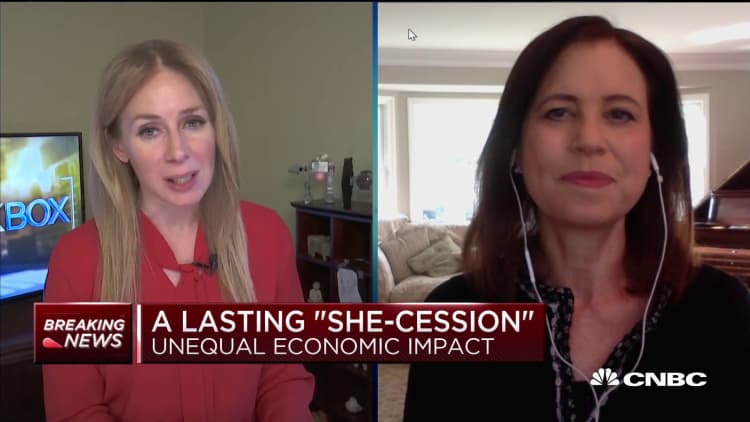
As pandemic causes soup sales to soar, Campbell Soup expects higher demand to continue
12 p.m. ET — After sales of Campbell Soup's iconic broths and soared 35% during its fiscal third quarter, the company is expecting to keep seeing elevated demand, even as the weather heats up and states reopen.
Campbell CEO Mark Clouse said on "Squawk on the Street" that retailers will have to restock their inventories, which will lift demand even if consumers are buying less of those products.
Still, Clouse said that he expects that consumers will continue to eat more soup and consume other Campbell's products compared to historic levels. The pandemic has reversed consumers' preference for fresher food options, reviving sales for categories that had been declining in recent years.
Shares of the company fell nearly 5% in morning trading despite it raising its 2020 outlook and topping analysts' earnings estimates. —Amelia Lucas
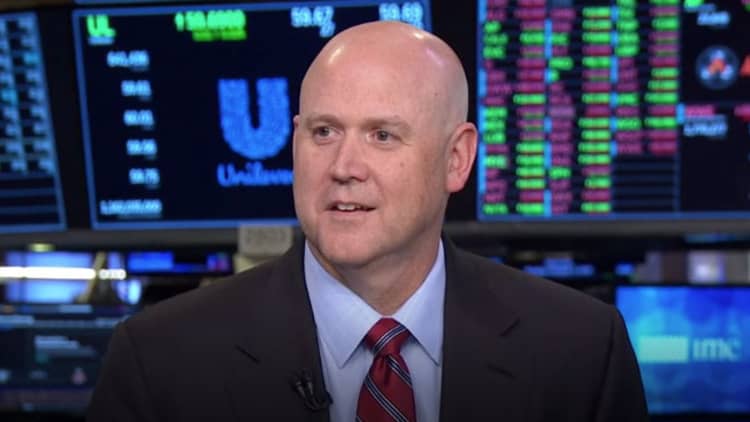
Reopening and protests could make for a bad fall season
11:25 a.m. ET — Amid nationwide protests over the death of George Floyd and the easing of restrictions across the country, public health specialists warn that Covid-19 threatens to bounce back later this year.
Some other countries that were hit hard by the virus, such as Germany and Italy, have driven down the number of daily new infections to just hundreds per day. The U.S. has struggled to do the same with more than 20,000 new cases diagnosed every day.
If that number doesn't fall, the country could be in for another major outbreak in the fall, public health specialists who spoke with CNBC said, adding that the protests are likely to spread the virus.
"It's heartbreaking on a number of levels, for sure from the infectious diseases and epidemiology levels," Dr. Katie Passaretti said. "You have big groups coming together and people from far apart places coming together. It's a risk for spread of Covid." —Will Feuer
NYC Mayor says curfew will end as first phase of coronavirus reopening plan begins
11:15 a.m. ET — New York City Mayor Bill de Blasio said that an 8 p.m. curfew imposed during the heated protests over George Floyd's death are set to be lifted Monday morning, when the city kicks off the first phase of its coronavirus reopening plan.
"We're going to end it, as per now … 5 a.m. Monday morning, curfew comes off," de Blasio said at a press briefing Wednesday. "I'd like for us never to have to use it again if we can do things right, and then we go right into the reopening."
The first phase of the plan to lift social distancing restrictions will include construction, manufacturing and wholesale businesses, as well as retail businesses that can provide curbside pickup services.
"New Yorkers are resourceful. I have great confidence people will be ready," the mayor said. He apologized to any businesses dealing with the "additional challenge" of having to repair their stores following the violence and property destruction that occurred during protests over the past week. —Kevin Breuninger
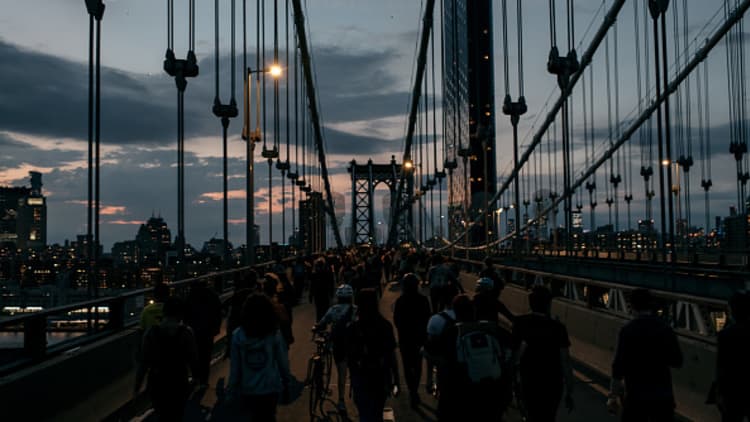
AMC has 'substantial doubt' it can remain in business after closing all of its locations during the pandemic
11:10 a.m. ET — AMC, the largest movie theater chain in the world, disclosed concerns about its liquidity and its ability to generate revenue in the wake of the coronavirus outbreak.
AMC shared preliminary earnings results that projected the company had lost between $2.1 billion and $2.4 billion in the first quarter ended March 31, while theaters were shuttered due to social distancing regulations. Expectations are that losses will be even steeper in the second quarter.
"We are generating effectively no revenue," the company said in its filing.
AMC also said it worried that distributors would continue to push back new film releases, either due to coronavirus restrictions on public gatherings or because of production delays, and that some studios will begin offering audiences more movies on-demand or through streaming. —Sarah Whitten
U.S. services PMI comes in better than expected
10:26 a.m. ET — The Institute for Supply Management (ISM) said its non-manufacturing activity index rose to a reading of 45.4 last month from 41.8 in April. Economists polled by Dow Jones were expecting a reading of 44.4 in May. The April figure marked the first contraction in the U.S. services sector since December 2009 as the coronavirus pandemic roiled the economy. –Yun Li
Dow jumps 200 points at the open, rising for a third day
9:40 a.m. ET — Stocks opened higher with the Dow Jones Industrial Average rising 230 points, on pace for a third straight day of gains, despite uncertainty surrounding days of demonstrations to protest the killing of George Floyd and the persistent coronavirus crisis. The S&P 500 climbed 0.7%, while the Nasdaq Composite 0.4%. The Nasdaq 100 index rebounded sharply from its March bottom, now sitting less than 1% from its record high. —Yun Li
J&J looking at virus' impact on black communities, CEO says
9:26 a.m. ET — Johnson & Johnson CEO Alex Gorsky said the company is looking into the coronavirus' disproportionate impact on black communities.
"What's the underlying nature? What can we do better to make sure your zip code isn't contributing more to your life expectancy, frankly, to other health-care factors," he told CNBC.
J&J has been working on a potential vaccine to prevent Covid-19, which has infected more than 1.83 million across the U.S., according to data compiled by Johns Hopkins University. The company expects human testing of its experimental vaccine to begin by September and it could be available for emergency use authorization in early 2021. —Berkeley Lovelace, Jr.
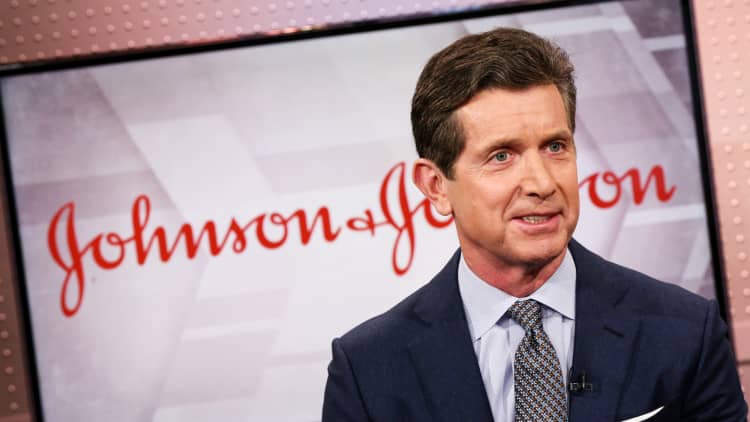
New cases in Africa continue to soar
Vaccine will be 'seasonal,' Dr. Scott Gottlieb says
7:32 a.m. ET — Any coronavirus vaccine that proves to be safe and effective will still probably only provide immunity for a limited amount of time, maybe "up to a year," former Food and Drug Administration Commissioner Dr. Scott Gottlieb said.
His comments come after White House health advisor Dr. Anthony Fauci said Tuesday he worries about the "durability" of a potential coronavirus vaccine, saying there's a chance it may not provide long-term immunity.
"This is probably going to be a seasonal vaccine," Gottlieb said in an interview with CNBC's "Squawk Box." "It's probably a vaccine that we're going to need to take every year. Dr. Fauci's right, the immunity's not going to be long term in the form of a smallpox vaccine or a polio vaccine where you get the vaccine once and you're protected for the rest of your life or most of your life."
Eventually, people might be asked to take the coronavirus vaccine annually along with the flu vaccine, Gottlieb said. —Will Feuer
Disclosure: Scott Gottlieb is a CNBC contributor and is a member of the boards of Pfizer and biotech company Illumina.
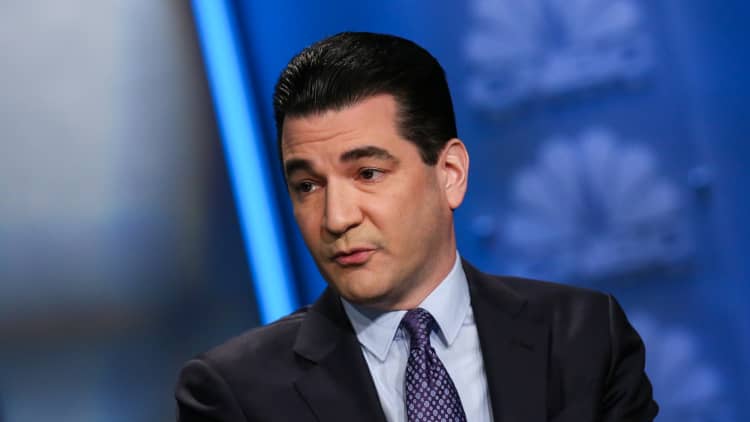
Sweden 'could have done better' in tackling outbreak, chief epidemiologist admits
7:02 a.m. ET — Sweden's chief epidemiologist, who advocated a no-lockdown strategy to combat the coronavirus crisis, conceded that more should have been done to tackle the epidemic.
"Yes, I think we could have done better in what we did in Sweden, clearly," Anders Tegnell, state epidemiologist at Sweden's Public Health Agency, told Swedish radio, according to a Reuters report.
"If we were to run into the same disease, knowing exactly what we know about it today, I think we would end up doing something in between what Sweden did and what the rest of the world has done," he said.
Unlike most of Europe, Sweden decided against implementing a full lockdown of businesses and schools when the coronavirus began to spread in Europe in March, opting instead for softer, largely voluntary measures. —Holly Ellyatt
Spain eyes reopening to some tourism June 22
6:56 a.m. ET — Spain is preparing to resume some tourism, allowing in visitors from countries where the coronavirus situation is considered under control beginning June 22, a tourism ministry spokesman said, according to Reuters.
Spain had previously targeted July 1 for reopening to tourism, Reuters reported. Tourism accounted for nearly 12% of Spain's GDP in 2017, according to the Organization for Economic Cooperation and Development. —Will Feuer
Read CNBC's previous coronavirus live coverage here: Euro zone unemployment rose under lockdown; India's cases exceed 200,000

